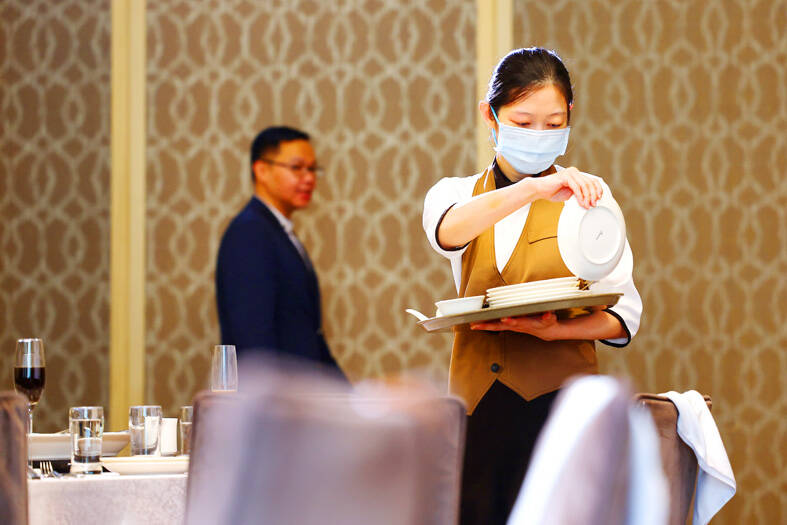The average monthly regular wage in September grew 3.22 percent from a year earlier to NT$46,643 (US$1,446), while the average total monthly wage — including overtime pay, performance-based commissions and bonuses — increased 3.41 percent to NT$56,346, the Directorate-General of Budget, Accounting and Statistics (DGBAS) said yesterday.
Wages improved as local firms adjusted compensation to ease a worker shortage and attract and retain talent, the agency said.
The median wage — a better gauge of typical regular pay as it is not skewed by extremes of high or low wages — stood at NT$37,290, representing an annual increase of 3.28 percent, DGBAS data showed.

Photo: CNA
That closely reflected a report by Academia Sinica’s Institute of Economics, which said the average monthly take-home pay of 80 percent of Taiwanese workers for the past three years was more than NT$30,000.
It also suggested that the monthly wage of the remaining 20 percent was close to the minimum wage of NT$27,470.
The report added that 54.7 percent of local firms raised wages three times during the three-year period and nearly 60 percent adjusted them by 5 percent.
Low pay is widely believed to be a main reason behind the worker shortage and high employee turnover rates at labor-intensive sectors.
Service providers generally have below-par monthly wages, the DGBAS said, citing data in the first nine months of the year.
The monthly wage averaged NT$34,418 at hotels and restaurants, and was slightly higher at other service providers, such as hair salons, at NT$35,766, the agency said.
Monthly regular wages averaged NT$44,187 at manufacturers and a higher NT$55,250 at local suppliers of electronic components, it said.
Hospitality facilities, non-tech manufacturers and construction firms have pressed the government to relax rules governing hiring of migrant workers to address labor problems.
The average regular wage was relatively high at financial and insurance companies at NT$56,403 per month and NT$51,398 at telecom operators and video publishers.
Seeing their business improve significantly this year, financial firms handed out better commissions and performance-based bonuses, the DGBAS said, adding that shipping companies and real-estate brokers likewise experienced a profit bump.
In September, the overall number of workers hired by the service and industrial sectors edged up 0.02 percent, or by 2,000 people, to 8.47 million, while overtime hours slid 0.2 hours from one month earlier, the agency found.
Overtime pay averaged NT$2,255, down 2.68 percent from August, as seasonal businesses linked to the summer was over. Furthermore, some manufacturers cut capacity to save on operating costs.

A magnitude 7.0 earthquake struck off Yilan at 11:05pm yesterday, the Central Weather Administration (CWA) said. The epicenter was located at sea, about 32.3km east of Yilan County Hall, at a depth of 72.8km, CWA data showed There were no immediate reports of damage. The intensity of the quake, which gauges the actual effect of a seismic event, measured 4 in Yilan County area on Taiwan’s seven-tier intensity scale, the data showed. It measured 4 in other parts of eastern, northern and central Taiwan as well as Tainan, and 3 in Kaohsiung and Pingtung County, and 2 in Lienchiang and Penghu counties and 1

FOREIGN INTERFERENCE: Beijing would likely intensify public opinion warfare in next year’s local elections to prevent Lai from getting re-elected, the ‘Yomiuri Shimbun’ said Internal documents from a Chinese artificial intelligence (AI) company indicated that China has been using the technology to intervene in foreign elections, including propaganda targeting Taiwan’s local elections next year and presidential elections in 2028, a Japanese newspaper reported yesterday. The Institute of National Security of Vanderbilt University obtained nearly 400 pages of documents from GoLaxy, a company with ties to the Chinese government, and found evidence that it had apparently deployed sophisticated, AI-driven propaganda campaigns in Hong Kong and Taiwan to shape public opinion, the Yomiuri Shimbun reported. GoLaxy provides insights, situation analysis and public opinion-shaping technology by conducting network surveillance

Taiwan is gearing up to celebrate the New Year at events across the country, headlined by the annual countdown and Taipei 101 fireworks display at midnight. Many of the events are to be livesteamed online. See below for lineups and links: Taipei Taipei’s New Year’s Party 2026 is to begin at 7pm and run until 1am, with the theme “Sailing to the Future.” South Korean girl group KARA is headlining the concert at Taipei City Hall Plaza, with additional performances by Amber An (安心亞), Nick Chou (周湯豪), hip-hop trio Nine One One (玖壹壹), Bii (畢書盡), girl group Genblue (幻藍小熊) and more. The festivities are to

AFTERMATH: The Taipei City Government said it received 39 minor incident reports including gas leaks, water leaks and outages, and a damaged traffic signal A magnitude 7.0 earthquake struck off Taiwan’s northeastern coast late on Saturday, producing only two major aftershocks as of yesterday noon, the Central Weather Administration (CWA) said. The limited aftershocks contrast with last year’s major earthquake in Hualien County, as Saturday’s earthquake occurred at a greater depth in a subduction zone. Saturday’s earthquake struck at 11:05pm, with its hypocenter about 32.3km east of Yilan County Hall, at a depth of 72.8km. Shaking was felt in 17 administrative regions north of Tainan and in eastern Taiwan, reaching intensity level 4 on Taiwan’s seven-tier seismic scale, the CWA said. In Hualien, the